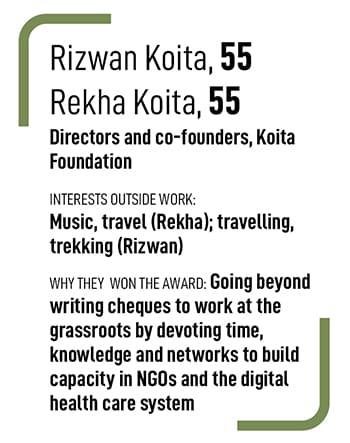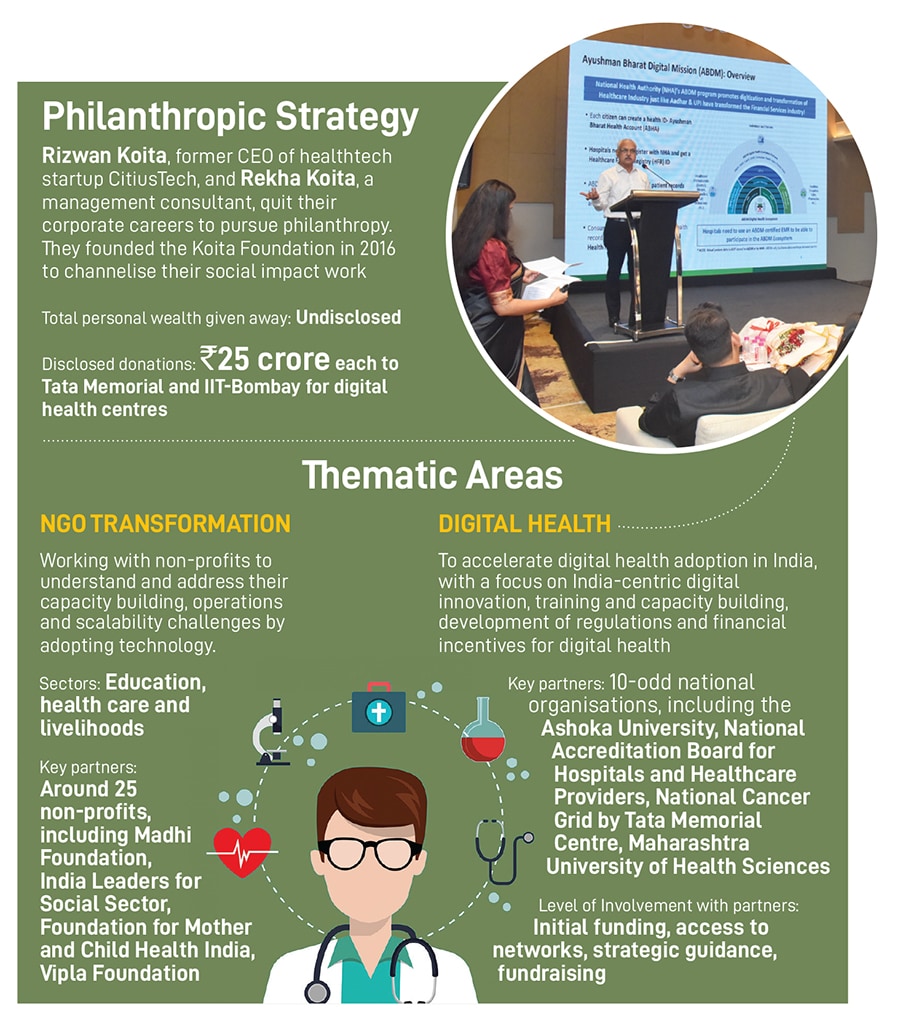Rekha and Rizwan Koita: Valuing knowledge sharing and time over writing cheques
The Koitas left their corporate careers for philanthropy. Through the Koita Foundation, they use technology to strengthen outcomes in health care and non-profits


The Koita Centre for Digital Health (KCDH) that Rizwan and Rekha Koita founded at IIT-Bombay, in 2021, by committing ₹25 crore of their personal wealth is a short walk away from the main gate of the campus. En route, they pass Café ’92, a popular haunt for students, which Rekha had taken the lead to build after fundraising from her batchmates. The café is named after the batch of 1992, the year Rizwan graduated from IIT-Bombay with a degree in electrical engineering, and Rekha in metallurgical engineering. Many years later, after Rizwan and Rekha decided to leave behind their career as a startup founder and management consultant, respectively, to walk steadfast towards philanthropy, their alma mater was among the most obvious starting points for a collaboration.
“We feel indebted to IIT-Bombay," says Rizwan, adding that they had been involved in several projects on campus over the years, including contributing to set up a health care innovation fund when he was leading the healthtech unicorn CitiusTech. The startup had close to 9,000 professionals and around ₹4,000 crore in revenue when he decided to step down as CEO in 2021.
Rizwan, who had the distinction of being the first non-MBA recruit by McKinsey in the 1990s before he turned entrepreneur, says he started thinking more seriously about getting into philanthropy when he turned 50. Rekha had already taken the plunge in the mid-2010s, spending time with non-profits to understand the issues they faced, and see how she can use her skills to build capacity and scalability in those organisations. “I always wanted to use my skills in the social sector, but did not know what exactly to do for many years. Then I found that many of the challenges they face could be solved by using technology," she says. Rekha eventually took on the role full time when they started the Koita Foundation in 2016.
 While Rekha primarily works with non-profits in the education, health care and livelihoods space, Rizwan puts his experience of running a healthtech startup to work with government, health care institutions and national-level organisations to support technology initiatives in the health care sector. The importance of technology in health care became evident to the Koitas particularly in the wake of the pandemic, spurring them to take action. Today, their Foundation works with close to 25 non-profits, and has collaborations with 10-odd organisations, like the Tata Memorial Centre, Ashoka University and the Maharashtra University of Health Sciences (MUHS).
While Rekha primarily works with non-profits in the education, health care and livelihoods space, Rizwan puts his experience of running a healthtech startup to work with government, health care institutions and national-level organisations to support technology initiatives in the health care sector. The importance of technology in health care became evident to the Koitas particularly in the wake of the pandemic, spurring them to take action. Today, their Foundation works with close to 25 non-profits, and has collaborations with 10-odd organisations, like the Tata Memorial Centre, Ashoka University and the Maharashtra University of Health Sciences (MUHS).
While writing cheques is part of their philanthropic strategy, it is not the defining factor. “We still don’t have a fixed corpus. We have committed that we will not be a grant-making entity, but be closely involved with all the initiatives we undertake," says Rizwan. “The limiting factor for us is not money, it is time."
For example, at KCDH that they founded to advance academics and research in digital health, they not only gave a grant to IIT-Bombay, but also defined the focus areas, hired people, and built working strategies. The centre designs courses for medical professionals in digital health strategies and management, right from patient care to data security, and enables research. Over 850 students enrolled in at least one digital health course at IIT-Bombay in 2024, Rizwan says. Along similar lines, the open-source Digital Health Foundation Course, which the Koita Foundation co-developed with MUHS was adopted by the National Health Authority last year.

The Koitas have also been working with national-level associations to standardise heath care delivery and processes in hospitals and health centres. Along with the National Accreditation Board for Hospitals and Healthcare Providers (NABH), the Foundation helped release digital health standards for hospitals, which were adopted by over 100 hospitals in the country as of September 2024, within a year of when they were launched.
Dr Atul Kochhar, CEO, NABH, explains that health care delivery in India is largely unstructured, with doctors and hospitals not following set guidelines for digital health, which could lead to disparity in the quality of care provided to patients, and affect health care delivery. While larger hospitals have started gathering digital health data, many smaller ones find it challenging to do so, due to reasons ranging from high costs to a steep knowledge curve, he explains.
The standardised digital health solutions that Rizwan is suggesting will help all health institutions, irrespective of size, to capture health data in a structured manner, right from electronic medical records to hospital information systems, Kochhar explains. “Sooner, rather than later, most hospitals are going to run on software. Rizwan not only thought of this ahead of time, but also started working towards it in a structured manner," he says.
Kochhar says he values not only the resources and networks the Koitas bring to the table, but also the “hours and hours" of their personal time that they devote to the cause. “For people who have money, the easiest thing to do is to give it away if they are so inclined, but guiding and taking people along towards shared goals is something the Koitas are good at doing," he says.
Rekha explains that many organisations, particularly fledgling non-profits, often need guidance to manage implementation. “You can put in money as a philanthropist, but if the execution is not successful, you are not helping them take the leap and scale their operations," she says.

One of their partners, the Vipla Foundation [formerly Save the Children India], was using technology provided by the Koita Foundation to improve learning outcomes in their early year intervention programme for children up to the age of eight. It involved building capacity in local balwadis in Mumbai by training teachers and developing educational learning materials. “One thing lacking was having real-time data to assess the ability of teachers to handle classrooms and learning outcomes," says Pramod Nigudkar, CEO, Vipla Foundation.
The Koitas helped them develop an app to be used by teachers in the balwadi to improve teaching and learn efficiency. It soon caught the eye of Mumbai’s municipal officials, and now the digital programme has scaled up from 50-odd balwadis around four to five years ago to 1,100 balwadis around Mumbai, says Rekha. According to data shared by the Foundation, in 2024-25, they trained 1,130 balwadi teachers, with a total enrolment of 34,528 students. The non-profit required handholding throughout the technology implementation process. “We have been discussing all small and big issues with them, like troubleshooting the app, or capacity issues with individuals who are using the app on the ground, or issues with the management of the programme on the government side. Both Rekha and Rizwan come up with insights and solutions," says Nigudkar. “When we had difficulty implementing the programme in a continuous manner, we requested their financial help. If not for that, Vipla would have faced difficulties matching the resources required and the programme would have faced a setback."
Unlike most philanthropists who directly run or support non-profit programmes, since the Koitas provide backend support through technology, it is often difficult to quantify the specific role the technology has played in the overall on-ground impact. But when the programmes start displaying greater efficiencies and scale, the digital tools can be credited in no small part for the multiplier effect. Rizwan says he has typically observed that digital transformation has helped make existing programmes 30 to 40 percent more efficient. “This makes the non-profits more attractive to donors because their impact numbers are higher," he says.
This approach to philanthropy, one centred on innovation and technology, is taking Indian philanthropy towards a new era, Neera Nundy, partner and co-founder of strategic philanthropy foundation Dasra, wrote in Forbes India in 2024. Characterising first-generation wealth creators like Rizwan and Rekha as “now-gen givers", she said their giving strategy, which is characterised by their tech-friendliness, is “leveraging data, tech, and narrative building to inform their philanthropic decisions, and supporting their grantee partners with both financial and advisory/ mentorship support".

One of the ambitious projects the Koita Foundation has taken up is to create digital strategies to support cancer and diabetes, because they are among the four disease classes (along with cardiac and neurological diseases), that will only become larger as India’s population ages, says Rizwan. At the National Cancer Grid at the Tata Memorial Centre [with a network of 300+ hospitals], they have committed ₹25 crore for the Koita Centre for Digital Oncology (KCDO) to help cancer hospitals in India adopt digital health tools.
They have also collaborated with the Research Society for the Study of Diabetes in India (RSSDI) to establish the Koita Centre for Digital Diabetology (KCDD), which will support the 11,500+ members of the RSSDI across 23 states to leverage digital technologies to improve diabetes care in India. “Rizwan brought experts on board to help us leverage tech to standardise care and reach different regions of the country, particularly underserved areas and people, and help technologists provide low-cost solutions customised to our requirements," says Dr Sanjay Agarwal, secretary-general, RSSDI. The KCDD is now leveraging learnings from the KCDO to build a National Diabetes Grid on the lines of the National Cancer Grid, Agarwal explains.
Through the Foundation, the Koitas want to create proof points of models that can be replicated by health care and non-profit organisations. Three institutions are setting up centres of digital health and Rizwan says they are happy to share the playbook of the KCDH at IIT-Bombay. “To me, the success of what we are trying to do is that, a decade from now, we will have many centres of digital health across India to cater to the country’s health care needs," he says.
First Published: Mar 17, 2025, 17:16
Subscribe Now